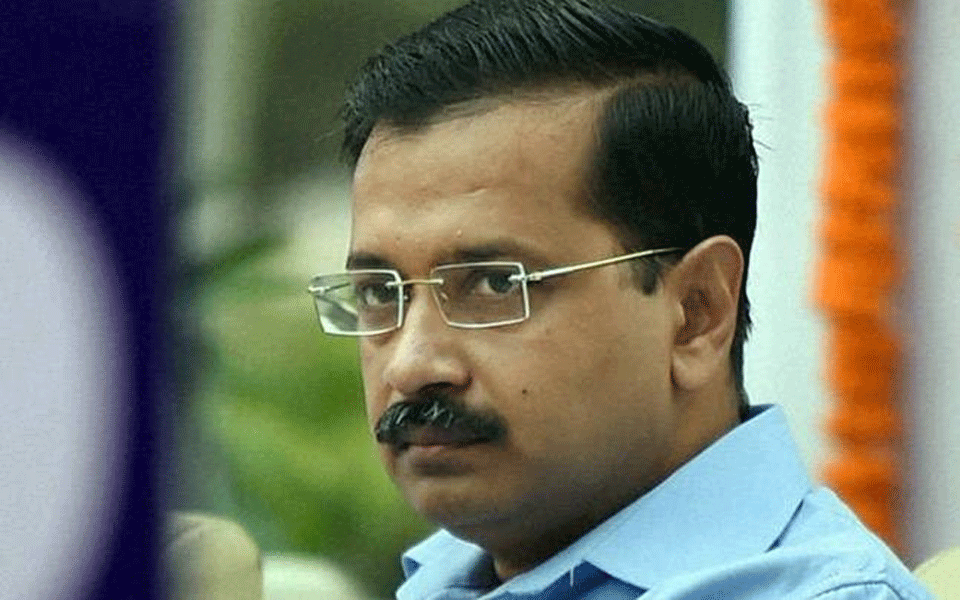New Delhi: Delhi Chief Minister Arvind Kejriwal has apologized to BJP leader and Union Minister Nitin Gadkari and Congress leader Kapil Sibal for making unverified allegations of corruption against them. Both withdrew their defamation cases against the AAP leader on Monday.
The development came days after Kejriwal regretted having accused Akali Dal leader Bikram Majithia of drug trade without evidence.
In a March 16 letter to Gadkari, Kejriwal said he was feeling sorry for making "certain statements, without regard to its verifiability, which seem to have hurt you...
"I have nothing personal against you. I regret the same. Let us put the incident behind us and bring the court proceedings to a closure."
He also suggested to the Union Shipping and Transport Minister that "we should put our energy to serve the people of this country in the spirit of mutual respect".
Consequent to the regret, Gadkari and Kejriwal later filed a joint application in the Patiala House Court, seeking withdrawal of the defamation case.
"Kejriwal has acknowledged that (the) complainant (Gadkari) was hurt on account of unverified allegations and expressed regret, in the larger public interest" and that "the complainant does not wish to pursue the defamation case", read the application.
The court allowed the plea and disposed of the case.
In 2014, Gadkari had filed the defamation suit against Kejriwal after he named him in a list of "corrupt politicians".
Kejriwal and his Deputy Chief Minister Manish Sisodia also wrote to Congress leader Kapil Sibal and his son Amit, seeking apology for making "unfounded" allegation against them at a joint press conference on May 15, 2013.
"Now, I have learnt that the allegation I made against you and your father at the press conference were unfounded. I hereby withdraw all my allegations made against you and your father and apologize for the same.
"The damage caused to your esteem, the hurt cause to your family, friends and well-wishers and the loss caused to you is regretted," Kejriwal and Sisodia wrote in separate but identical letters.
The four -- Kejriwal, Sisodia and the Sibals -- then jointly wrote to the court seeking withdrawal of the defamation case by the Sibals. The court disposed of the case filed by Amit Sibal after Kejriwal alleged conflict of interest over his appearing in the Supreme Court for Telecom major Vodafone when his father was the union Communication Minister.
Kejriwal has been dragged to courts in several defamation cases by various political leaders, including Finance Minister Arun Jaitley and former Delhi Chief Minister Sheila Dikshit.
Last week, the AAP leader wrote to Akali Dal leader Bikram Majithia for accusing his of involvement in drug trade without any proof to back the allegations..
The apology triggered a virtual rebellion in the AAP Punjab unit, leaing to the resignation of Bhagwant Mann as its Punjab Unit chief.
Let the Truth be known. If you read VB and like VB, please be a VB Supporter and Help us deliver the Truth to one and all.
Ottawa (PTI): Three Indian nationals have been arrested by Canadian police on an anti-extortion patrol and charged after bullets were fired at a home.
Harjot Singh (21), Taranveer Singh (19) and Dayajeet Singh Billing (21) face one count each of discharging a firearm, and all have been remanded in custody until Thursday, the Surrey Police Service (SPS) said in a statement on Monday.
The suspects were arrested by patrol officers after an early morning report of shots fired and a small fire outside a home in Surrey's Crescent Beach neighbourhood, the LakelandToday reported.
On February 1, 2026, the SPS members were patrolling in Surrey’s Crescent Beach neighbourhood when reports came in of shots being fired and a small fire outside a residence near Crescent Road and 132 Street.
The three accused were arrested by SPS officers a short time later, the statement said.
SPS’s Major Crime Section took over the investigation, and the three men have now been charged with Criminal Code offences, it said.
All three have been charged with one count each of discharging a firearm into a place contrary to section 244.2(1)(a) of the Criminal Code.
The investigation is ongoing, and additional charges may be forthcoming. All three have been remanded in custody until February 5, 2026.
The SPS has confirmed they are all foreign nationals and has engaged the Canada Border Services Agency, it said.
One of the suspects suffered injuries, including two black eyes, the media report said.
Surrey police Staff Sgt. Lindsey Houghton said on Monday that the suspect had refused to comply with instructions to get out of the ride-share vehicle and started to "actively resist."
"As we were trained, he was taken to the ground and safely handcuffed," said Houghton.
A second suspect with a black eye was also injured in the arrest after refusing to comply, Houghton said.
The arresting officers were part of Project Assurance, an initiative that patrols neighbourhoods that have been targeted by extortion violence.
Houghton said the Canada Border Services Agency (CBSA) is also involved because the men are foreign nationals, and the trio may face additional charges.
It's not clear if the men are in the country on tourist visas, a study permit, or a work permit, but Houghton said CBSA has started its own investigation into the men's status.
Surrey has seen a number of shootings at homes and businesses over the last several months, but there's been an escalation since the new year.





